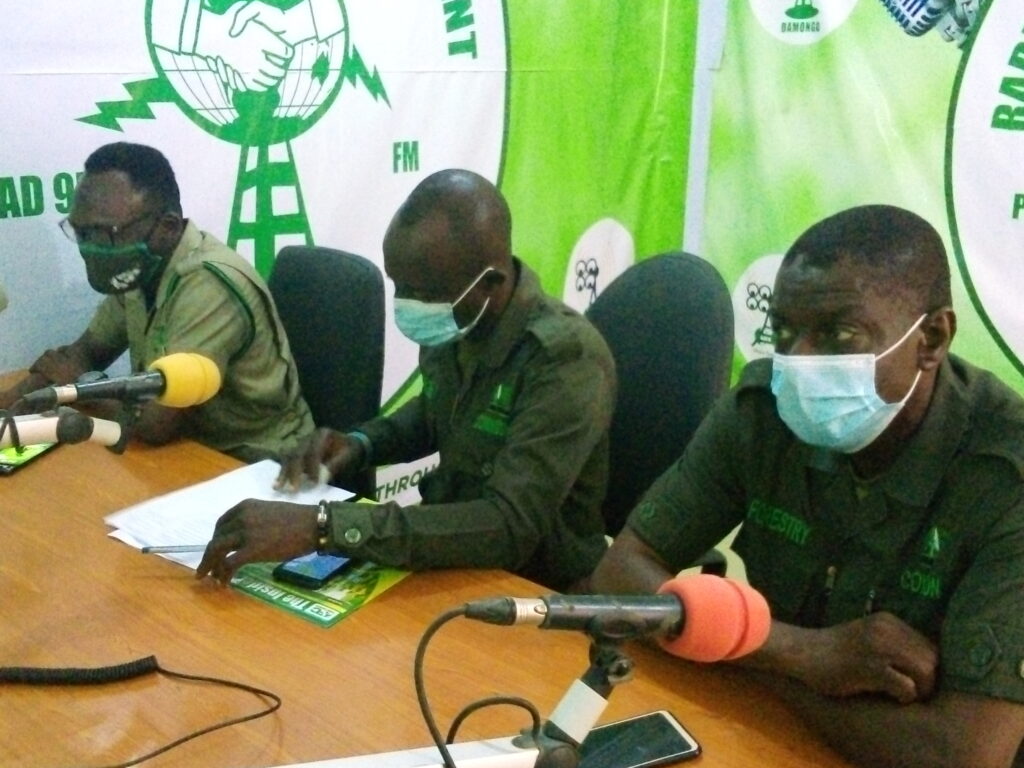By Abdulai Zulkaninu/March 2, 2021.
An environmental NGO, A Rocha Ghana is calling on the government of Ghana and state institutions to do a lot more to mitigate the destruction of environment and products therein.

In a statement to mark World Wildlife Day, Daryl E. Bosu, the Deputy National Director explained that there are numerous importance of the environment to Ghana and the world and, if care is not taken to control its destruction, the consequences will be disastrous for the country.
The day is celebrated March 3 each year.
This year’s World Wildlife Day is celebrated under the theme, “Forests and Livelihoods: Sustaining People and Planet.”
Read the detailed release below.
Media Brief
World Wildlife Day 2021
Forests and Livelihoods: Sustaining People and Planet.
The United Nations (UN) World Wildlife Day (WWD) is a universal celebration of the beautiful and richly diverse forms of wild animals and plants on our planet. It is also an occasion to raise awareness of the many benefits they provide to people and to drive discussions and work towards transformative change on the urgent threats facing them.
WWD takes place annually on the 3rd of March. This year, WWD will be celebrated under the theme, “Forests and Livelihoods: Sustaining People and Planet.”
The aim is to stress the immense value of forests and forest-dwelling wildlife species and for the economic, social and cultural well-being of communities around the world.
It also underlines the importance of sustainable use of forests and forest species in reaching the
United Nations Sustainable Development Goals (SDGs), particularly 1 (No Poverty), 2 (Zero hunger) 12 (Ensure sustainable consumption and production patterns), 13 (Climate Action)
and 15 (Life on Land).

Importance of Forests
When we drink a glass of water, write in a notebook, take medicine for a fever or build a house, we should be quick to make a connection with forests. Forests supply wild fruits, bush meat,
mushrooms and snails, which contribute directly to Sustainable Development Goal (SDG) 2 on Zero Hunger and also the medicinal plants that forest supply contribute to SDG-3 on Good Health and Well-being of the people.
In terms of environmental benefits, forests provided shelter for terrestrial biodiversity in line with SDG-15 on Life on Land and also, forests are a natural means for carbon capture and storage, helping to stabilize the climate and contributing to SDG-13 on Climate Action.
In Ghana, forests also play a crucial role in the achievement of the SDG 6―Clean Water and
Sanitation as most of the country’s water sources take their heads from forest reserves. For instance, over 5 million people depend on water from the Atewa forest―the Densu, Birim and Ayensu Rivers (major sources of water) take their root from Atewa Forest. The importance of forests therefore cannot be underestimated.
According to the United Nations, between 240 and 350 million people live within or adjacent to forested areas globally, relying on the various ecosystem services provided by forests and
forest species for their livelihoods and to cover their most basic needs, including food, shelter, energy and medicines. Wood and non-timber forest products also make up a fifth of incomes
in rural households in developing economies with access to forest resources, and the forest sector powers over 80 million jobs globally.
Forests and Indigenous people
Indigenous peoples and local communities are at the forefront of the symbiotic relationship between humans and forest ecosystem services, including the wild fauna and flora these environments shelter. These communities rely to a higher extent on the plentiful ecosystem
services and wildlife in such environments. Roughly 28% of the world’s land surface is currently managed by indigenous people.
Protecting Ghana’s Forests
With all of the listed public goods that forests offer, it is imperative that we do all we can to protect our forests.
Deforestation and land degradation are not new phenomena in Ghana, but
rather reflect a pattern that has persisted for decades. The recent World Bank Ghana Country
Environmental Analysis (CEA) report of 2020 based on analysis of data from 2001-2015 indicated that, Ghana’s annual deforestation rate was approximately 3.51 percent, equating to yearly losses of greater than 315,000 hectares (ha). Total deforestation during this time period surpassed 4.7 million ha, of which over 84 percent (3.98 million ha) occurred in open forests,
compared to 16 percent (745,326 ha) in closed forests. Deforestation in Ghana is attributed to
over exploitation of natural resources through illegal and unsustainable logging and mining, and agricultural expansion, coupled with land tenure insecurity. Ghana’s deforestation pathway
is characterized by incremental degradation over time. Time and time again we have heard that
government in its wisdom had embarked on sustainable management plans for the country’s
forest and its resources, but on ground we seem to be doing little in building resilience for communities who are most affected by the depletion of the forest regions. A clear case of this
mishap is the inclusion of the Atewa forest (one of the last two upland forests in Ghana) in targeted areas for bauxite mining.
When we take away the forest, it is not just the trees that go, the entire ecosystem begins to fall
apart, with dire consequences for all of us.
We can go on and list a thousand and one reasons why sustainable management of our forest
areas must be considered without it falling into a fitful sleep over and over again. But until the reasons and consequences of destruction of the forests are brought into focus, a transformative thinking can never be formed.
We therefore share a few proposals for consideration and action:
- The current land conversion ongoing in most forest reserves across the country as a result of illegal mining activities should be halted with immediate effect. Mining is not
compatible with forest reserves and the services they provide Ghanaians. In particular, plans by Government to convert a critical watershed like Atewa Range Forest into a
bauxite mine pit should be abandoned with immediate effect. - Government and state institutions should recommit to enforcing existing regulations on
forest management. The Forestry Commission in particular needs to recommit and
dedicate to its core management and vision. - All state protected forest estates should be adequately resourced both in terms of personnel and logistics to improve security for these areas.
- There is a need for inclusive and incentive based collaborative engagement with
communities neighbouring these estates. As we encourage shared responsibility, government and state agencies should commit and ensure a transparent share in the
benefits accruing from sustainable forest management. - Political interference in the work of forest resource managers should cease. The politicians should leave forest management to the technicians. The interference and
control in the work of the forest resource management is too much.
For Further Information
Daryl Bosu – 02025557.
www.padfm.com.gh















